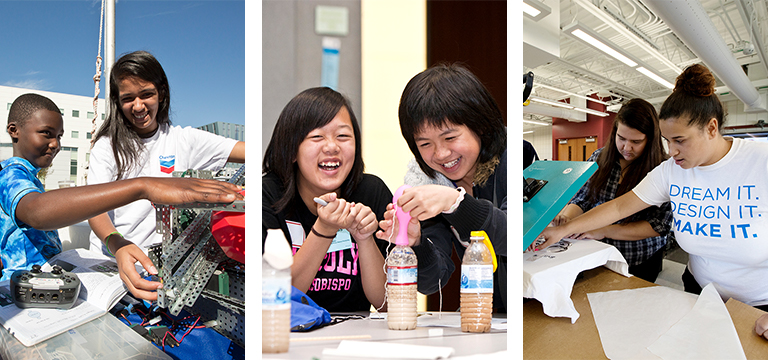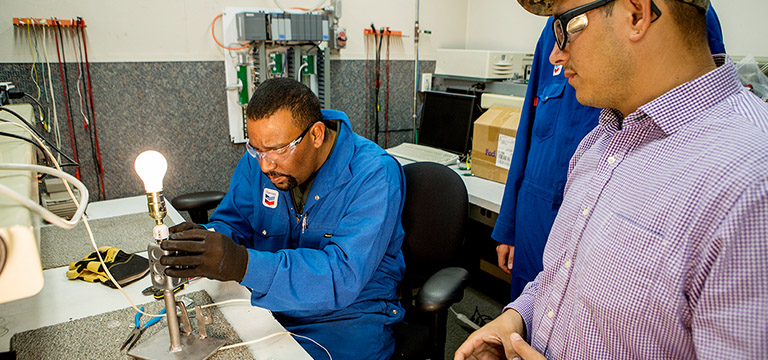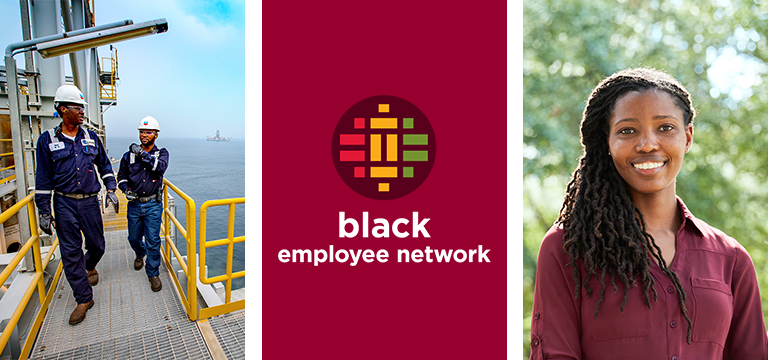feature
racial injustice, a year in reflection
In response to a convergence of events that included the spread of COVID-19, an economic downturn that led to massive unemployment and social unrest growing out of the death of George Floyd and other Black Americans in the United States, we made a commitment to address barriers to racial equity.
Our commitment started by listening. Chevron employees and leaders shared their emotions, perspectives and vulnerabilities on internal dialogue platforms, in town halls, and sponsored forums from our Black Employee Network. We heard employees express experiences and painful events, and engaged in important discussions on race that were often uncomfortable.
Our approach to addressing barriers to equity also included a $15 million pledge to support Black employees and the Black community. This commitment is based on four strategic pillars: education, job creation, talent and leadership development, and community and small business partnerships.
what does this commitment mean?
education
job creation

black talent and leadership development
community and small business partnerships
strategy into action
what we're doing

Rhonda Morris
vice president and chief human resources officer
our success stories

advancing racial and social equity in education

- Chevron collaborated with two Chevron social investment partners, National Society of Black Engineers (NSBE) and Techbridge Girls, to launch the first Summer Engineering Experience for Kids (SEEK) program aimed to introduce middle school girls of color to careers in science, technology, engineering, and math. Students will explore robotics, drones, and coding through hands-on activities, guided by Chevron volunteers and NSBE’s collegiate mentors.
- Thurgood Marshall College Fund (TMCF), the nation’s largest organization exclusively representing the Black College community, appointed Pierre Breber, Chevron’s Chief Financial Officer to their Board of Directors. Through scholarships, capacity building and research initiatives, innovative programs, and strategic partnerships, TMCF is a vital resource in the K-12 and higher education space.

job creation

Recognizing that the energy industry is transitioning, we seek a diversity of talent to meet future global energy needs. Together with the American Petroleum Institute (API) and API member organizations on the API Diversity, Equity, and Inclusion Member Working Group, Chevron is working to help a joint industry job readiness program as a way to upskill local talent and support their career pathways to enter Operations & Maintenance (O&M) roles. The program will prepare students with foundation skills and knowledge required for O&M roles and help open job opportunities for program graduates to be considered by participating API member companies.

black talent and leadership development

- We increased leadership development training through our partnership with the Executive Leadership Council (ELC) to strengthen Chevron’s Black leadership pipeline. In the second half of 2020, 37 Chevron employees participated in ELC leadership development programs. Efforts like these, had yielded movement of several Black employees into senior positions.
- We are also focused on increasing our workforce’s understanding of Black experiences and adopting, or revising practices, policies, and programs to create greater racial equity. The leadership team of Chevron’s Black Employee Network sponsored a reverse mentoring program with our Chairman and CEO and members of his executive leadership team to provide greater understanding on how racial injustice perpetuates inequalities for Blacks.

community and small business partnerships
- Chevron is working with the American Petroleum Institute’s (API’s) Diversity, Equity and Inclusion (DE&I) Member Working Group focused on efforts to further workforce and supplier diversity. API aims to help increase opportunities for diverse suppliers across the industry and better recruit minority skill seekers in the oil and natural gas industry. Chevron’s Chief Procurement Officer is also representing the Company on the National Board of Directors for the National Minority Supplier Development Council.
- Chevron has made a $150,000 3-year pledge to the East Oakland Youth Development Center (EOYDC), comprised of two critical programs for the organization – Chevron Future Leaders Academy and Chevron EOYDC Special Scholarship Program. The Chevron Future Leaders Academy is a core component of EOYDC’s Pathway to College and Career program, though which members of Chevron’s Black Employee Network (BEN) will serve as role models/mentors to the student participants, introduce students a variety of STEM-related careers that exist within the Corporation, and facilitate discussions about their careers and academic pathways via recurring virtual seminars. The Chevron EOYDC Special Scholarship Program will provide funding to EOYDC graduates who need assistance with overcoming the financial impact to household income resulting from the COVID-19 pandemic. These circumstances would have caused students to postpone, and in some cases, rescind college registration due to lack of resources.
Published: June 2021